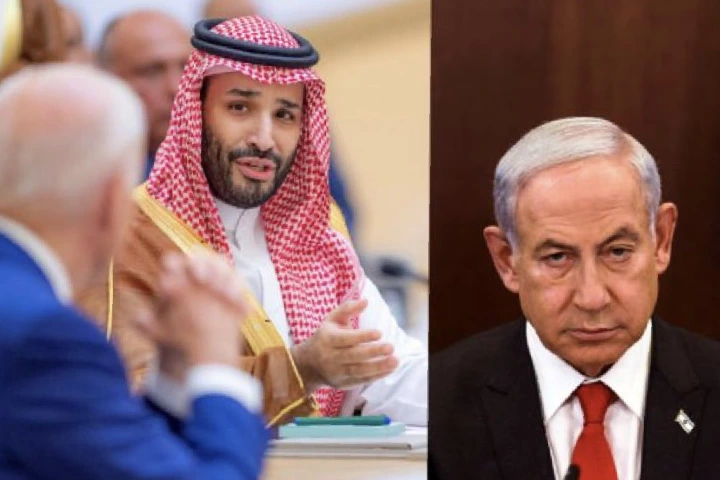Possibilities of Saudi-Israeli détente seem all but over. Saudis have made it clear to both Tel Aviv and Washington that “Palestinian statehood has to be precursor” for any movement towards reconciliation. “The two-state solution must return to the forefront,” Saudi Foreign Minister Prince Faisal bin Farhan al-Saud said in remarks to state TV on Tuesday.
“Half-baked ideas about a final Palestinian-Israeli agreement,” said a commentator to elaborate the Arab position, “in reality do not resolve underlying causes of conflict but cement an increasingly violent status quo. So, there must be absolute clarity on Palestinian statehood.”
For months, the US has been leading an effort to strike an agreement between Saudi Arabia and Israel that would see them normalise relations — similar to the Abraham Accords struck between Israel and the United Arab Emirates, Bahrain and Morocco.
Saudi’s terse position, though maintained all through, was not expected and there were almost certain expectations that royals, who are pursuing moderation with missionary zeal, would agree to the “impossible” rapprochement with the Jewish state. However, earlier this month, a Palestinian delegation travelled to Saudi Arabia for talks to discuss the Palestinian Authority’s role in a possible normalisation deal between Riyadh and Israel. Then the picture changed.
Saudi foreign minister says there will be no solution to the Palestinian-Israeli conflict without an independent Palestinian statehttps://t.co/dasNTqy59p
— Middle East Eye (@MiddleEastEye) September 19, 2023
Saudi Arabia has held out on the offer to normalise ties with Israel since 2002, sticking to the Arab Peace Plan, which calls for an independent Palestinian state in the West Bank and Gaza Strip, with East Jerusalem as its capital.
On Monday, The Jerusalem Post reported that Riyadh has communicated through the US that the “extremist” character of Israel’s right-wing government, led by Prime Minister Benjamin Netanyahu, is obstructing any potential improvement in relations with the Palestinians, consequently affecting ties with Saudi Arabia.
Saudi Arabia is home to Islam’s holiest sites, Mecca and Medina, giving it a crucial role in the Muslim world where Palestinian statehood is deeply cared about. Israel’s current government led by Benjamin Netanyahu has no intention of giving major concessions to the Palestinians; Netanyahu in early August told Bloomberg TV that any minor gestures on his part toward Palestinians would essentially be “just a box you have to check to say that you’re doing it.
🗺️ Saudi Arabia’s Map: Despite recent US-brokered normalization talks between #Israel and Saudi Arabia, the entirety of the Jewish State is still referred to as Palestine in the country’s updated, official map.#SaudiArabia | #Israel | #Palestine
📷SAUDI ARABIA’S GENERAL… pic.twitter.com/shWlUQQdLJ— The Jerusalem Post (@Jerusalem_Post) September 16, 2023
Breakdown Fallout
The breakdown of the Arab-Israeli normalisation will have far reaching consequences for fast-changing geo-strategic equations not only in the Middle East but in the larger part of the globe. Many trade and strategic linkages are being planned keeping in mind a united West Asia where Israeli city and ports will be connected to their Arab counterparts.
Considering such mammoth planning, the Israelis and Americans haven’t accepted that talks between the Saudis and Israel have reached a dead-end and their diplomats have expedited the lobbying with the Arabs on the sidelines of ongoing United Nations General Assembly (UNGA).
The reconciliation between Riyadh and Tel Aviv has been an ambitious project of US President Joe Biden before kickstarting his 2024 rerun campaign. The failure of this project will bring down the rating of Biden at a crucial time when even the Ukraine war, another of his major foreign front involvement, is not going well. Republicans will pounce on him.
Another worry for the US is Saudi demands of getting more US weapons, security guarantee and aggravated form of civil nuclear agreement. All these demands, analysts say, are impossible to meet along with Palestinian statehood. So, spurned by the US, Saudis will turn to Chinese and Russians, creating more ripples in Washington.
The proposed India-Middle East-Europe economic corridor was also said to be a step in the direction of linking Saudis and Israel with direct trade routes and ultimately paving the way for normalization between them. With the breakdown of Saudi-Israel talks, the future of the corridor is likely to be uncertain, at least for the beginning. Here too, the first winner will of course be China whose BRI initiative has already explored alternate options to stay in the race.
“This initiative of very important countries…They are not doing it because they are against somebody and something.They’re doing it because they are for something” says EAM Jaishankar @DrSJaishankar on if India Middle East Europe Corridor is counter to China’s BRI pic.twitter.com/tzmTZP89oQ
— Sidhant Sibal (@sidhant) September 14, 2023
According to a Chatham House estimate, all the US efforts to bring Saudis and Israelis on the same table were to trim down China’s growing influence in the region and the failure of talks will mean a severe blow to that aspiration.
Meanwhile, an important detail missed by Middle East commentators is the reaction of Jordan, which has uttered nothing on the economic corridor, anticipating success of the Saudi-Israel talks. This is despite the fact that the corridor has been planned in a way that it will chug through its territory. It may further complicates the corridor’s prospects.
Another casualty of the talks’ failure will be Israel’s widespread recognition that Tel Aviv has expected. Once the Kingdom would welcome Israelis, a number of Muslims nations would likely follow suit. A deal could lead to recognition from other Muslim-majority countries, including Indonesia and Malaysia.
Winning over Saudi Arabia, Israel and US were aiming to secure more Saudi support in deterring Iran, which, as of now, stands to gain the most from the wider political and economic impact of normalising relations with the Saudis, a key Arab country and opinion-maker in the Muslim world.
Also Read: Why Biden’s patch up bid between Saudi-Arabia and Israel may become a flop show




















